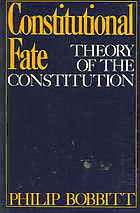
Constitutional Fate : Theory of the Constitution PDF
Preview Constitutional Fate : Theory of the Constitution
CONSTITUTIONAL FAT E This page intentionally left blank CONSTITUTIONAL FATE Theory of the Constitution Philip Bobbit t New York Oxfor d OXFORD UNIVERSITY PRESS Copyright © 1982 by Oxford University Press, Inc. First published by Oxford University Press, New York, 1982 First issued as an Oxford University Press paperback, 1984 Library of Congress Cataloging in Publication Data Bobbin, Philip. Constitutional fate. Includes bibliographical references and index. I. Judicial review—United States. I . Title. KF4575.B63 198 4 347.73'1 2 83-1734 3 ISBN 978-0-19-503422-6 (pbk.) 347.3071 2 Printing (last digit): 13 Printed in the United States of America To Rebekah Johnson Bobbitt This page intentionally left blank I would like to say "This book is written to the glory o f God " bu t nowaday s that woul d b e chicanery, that is, the tric k of a cheat, for i t would not be rightly understood. I mean sim- ply that it came at an end of another's suffering and is intended to serve a value I cannot name that is other than mere self-regard. Insofar as I have failed t o be in harmony with this value, my book will fall short of the vision it is an at- tempt to express. ACKNOWLEDGMENTS There are many persons to whom I have shown the manuscript that preceded this book, so many in fact that a lawyer might say publication has long since occurred. Those faithful and respon- sive readers know who they are; I know who some of them are. One group of students, my seminar in the 1978-197 9 terms, earned my enduring affection so patient were they with my ef- forts and so willing to test theoretical approaches at a time and in an environment that can scarcely have encouraged thes e ap- proaches. The members of this group were Gary Amsterdam, Parker Folse , Barbar a Lipscomb , Oli n McGil l an d Richar d Pappas. The Dea n of the University of Texas Law School, Er- nest Smit h an d hi s Associat e Dean s Georg e Schatzk i an d Michael Sharlot , collaborate d t o contriv e writin g tim e an d financial support for me. At an important time the Russell Sage Foundation supplied additional funds to support my work, in- terrupted b y service in Washington in 1980-1981 . Douglass Cater and Joseph Slater, of the Aspen Institute, and Marshall Robinson and Peter Dijanosi of Russell Sage, cooperated i n this generous effort . I ough t als o t o mentio n letter s fro m m y teachers, Gran t Gilmor e and Gilber t Harman , tha t came at times when I was convinced that no serious, sensitive reading of my wor k was likely an d tha t publicatio n ought t o be aban- ACKNOWLEDGMENTS I X doned. Professor Barbara Aldave, my colleague, has been my companion in countless conversations whose benefit has been almost wholly mine. Susan Rabiner, of the Oxford University Press, has been a hopeful but not intrusive editor. Mark Sagoff, of the Center for Philosophy and Public Policy at the University of Maryland, has been helpful. The firs t draf t of this manuscript was written in Austin, Texas. Sinc e the n wor k o n thi s boo k ha s proceede d i n Washington, London, Vienna and Oxford; it leaves my hands as I have just returned to Austin and my house where the ini- tial work was done. In all these places there have been persons, unacknowledged here, who have assisted me. There is another, however, without whom that first draft could not have been done. Miss Katherine Burghard, careless of her many sacrifices and efforts on my behalf, was my indispensable ally and sup- port. I f ther e i s merit in the result , it is merit that she ha s helped bring into being. Excepting thes e acknowledgments , I hav e ha d doubt s about providing a preface. My aim in this book is to plunge the reader into a world, the experienc e o f which wil l cultivate a particular sensibility toward the Constitution so that, at least as to the fundamental question of the legitimacy of judicial re- view, the matter can be debated with a sense of fitness and not hollowly. A preface is of course likely to detract from this ex- perience becaus e i t must be constructe d ou t o f th e stylisti c materials it wishes to do away with. But I have become con- vinced that, without some introductory guide, the book is likely to be misunderstood an d i t would be irresponsible of me to allow a misplaced popularity to stand uncorrected out of vanity. This book presents a general theory of Constitutional deci- sion. It is not written in a conventionally theoretical manner . The wa y in which this theory is presented is naturally deter- mined by some of the assumptions of the theory itself and, like it, differs fro m th e standard models in this subject. This is a difference i n kind and therefore i t is to be expected tha t the mode of presentation i s different also. The standar d model s are presented i n a standard way. The difficult y arises because the method of presentation cannot prevent the contemporary reader from assimilating it into the standard modes. For exam-
